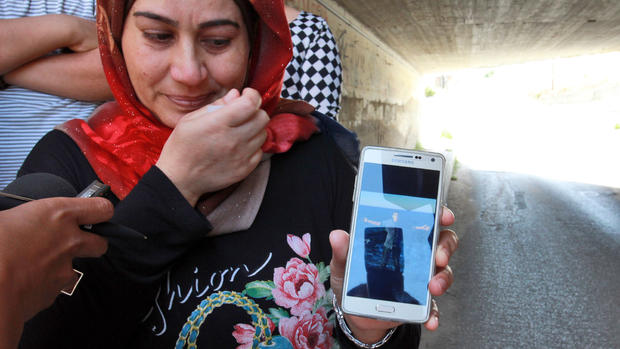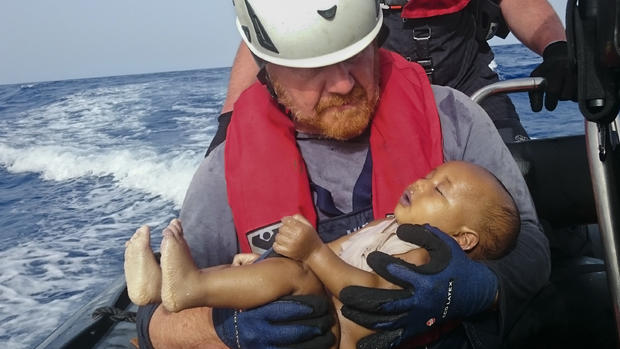Joy and despair for Syrian family rescued from hell
SICULIANA, Italy -- The Jaqali family was crammed into the metal fishing boat, packed with more than 700 migrants on their way from Libya to Italy. Father, mother and daughter squeezed together at the front of the bow, while the two sons were split up on either side.
When help finally came, they all got off the boat except for the oldest son, Mohammed. He couldn't move and waved to the others, motioning: I will follow you.
That was the last they saw of him. As people scrambled to get off, the boat lurched violently from side to side. Then it tipped over. The Jaqalis watched helplessly from afar as those left behind, like crawling ants, fell straight into the water.
The Jaqalis are among more than 20,000 people who have made the perilous sea journey from North Africa to Europe in overcrowded boats so far this year. Some 2,500 died or went missing at sea - up from 1,800 in the same period last year, according to the United Nations refugee agency. Estimates for those dead from the Jaqalis' boat alone go up to 250.
Rashid Jaqali, a 45-year-old Kurd from northern Syria, had moved his family to Libya so that the Kurdish militia couldn't recruit his sons. But Libya's chaos quickly spread, and Islamic State of Iraq and Syria (ISIS) militants inched closer to the family's refuge in the city of Zawiya. With none of the children schooled and the father not getting paid for his work, life in Libya became even worse than in Syria.
The family decided to move to Germany, where they had relatives. Jaqali paid off his debts, tied up loose ends and forked out about $1,200 to a smuggler.
Mohammed, 17, prepared his own backpack; he liked to dress well. He took a selfie with his new haircut, and promised his sister a camera when they got to Germany. He had no friends in Libya to say goodbye to.
His mother, Fatma, stuffed another backpack, keeping her jewelry well protected.
"The enemy is behind you, and the sea is in front of you. Where is the escape?" asked Rashid. "The sea is the escape."
Just after midnight, hundreds of migrants gathered in a warehouse with metal gates, where their smugglers had brought them. The smugglers took the migrants to the beach and shoved 60 or 70 people at a time into a small inflatable boat meant for 20.
The inflatable ferried them to a larger fishing boat moored a few miles offshore. The Africans were housed in the bottom, near the engine, with no windows and access to above only through a well-guarded ladder. Other young men and women went in the upper and middle decks, and the few families on board sat in front.
Despite protests from the passengers, the smugglers overloaded the boat. When one woman complained, a smuggler told her, May you all die.
The Jaqalis couldn't sit together. Rashid could see Mohammed and 15-year-old Yehia and gestured occasionally, but no movement was allowed so as not to tip the boat.
By 10 a.m., after six hours, the engine finally stopped. When help from the Italians arrived, relief turned to mayhem. The rescuers threw life vests into the water, and the young men on board swarmed to the same spot to grab them. The commotion started the boat rocking.
"We would say, calm down, kids. You will all get one," Rashid Jaqali said. "No one waited....Instead of rescue, there was death with those vests."
The rescuers first saved the women, the children and the families. Yehia slid along the metal bars in the middle of the boat to reach his parents, terrified. Rashid squeezed him between two women and pushed them upfront for the rescuers.
When Rashid looked over, there were 20 people ahead of Mohammed.
Now migrants were climbing up from the engine level, making the boat sway even more. Rashid recited the Fatiha, the Quranic verse Muslims say when in trouble, as he got into the inflatable.
When Fatma stepped off, she spotted Mohammed, still sitting down close to the metal bars.
"He waved at me and said go, and they will come and get me. He said that with his hands," she said in tears. "He wanted to save me. But my heart was burning, not saved."
The boat was rocking wildly. When Rashid took one more look back, it had tilted over.
Five days later, Fatma was still waiting to hear word about Mohammed. Holding out pictures of her son, Fatma said: "I dreamt of him. He was smiling at me. Only his leg was injured. I saw him three times. He was alive."
On the sixth day, the news finally reached the Jaqalis: Mohammed was dead. Suzanne put flowers in the window sill to mark the loss of her brother. Fatma said her son hit his head and died on the spot.
"Didn't I tell you I dreamt of him wounded? He was smiling at me from afar," she said, sitting on her bed with glazed eyes.
A day later, Fatma was hospitalized. She passed out and had the shivers.
A week and a half since, the Jaqalis have yet to bury their son. Their plans SICULIANA, Italy (AP) - The Jaqali family was crammed into the metal fishing boat, packed with more than 700 migrants on their way from Libya to Italy. Father, mother and daughter squeezed together at the front of the bow, while the two sons were split up on either side.
When help finally came, they all got off the boat except for the oldest son, Mohammed. He couldn't move and waved to the others, motioning: I will follow you.
That was the last they saw of him. As people scrambled to get off, the boat lurched violently from side to side. Then it tipped over. The Jaqalis watched helplessly from afar as those left behind, like crawling ants, fell straight into the water.
The Jaqalis are among more than 20,000 people who have made the perilous sea journey from North Africa to Europe in overcrowded boats so far this year. Some 2,500 died or went missing at sea - up from 1,800 in the same period last year, according to the United Nations refugee agency. Estimates for those dead from the Jaqalis' boat alone go up to 250.
Rashid Jaqali, a 45-year-old Kurd from northern Syria, had moved his family to Libya so that the Kurdish militia couldn't recruit his sons. But Libya's chaos quickly spread, and Islamic State militants inched closer to the family's refuge in the city of Zawiya. With none of the children schooled and the father not getting paid for his work, life in Libya became even worse than in Syria.
The family decided to move to Germany, where they had relatives. Jaqali paid off his debts, tied up loose ends and forked out about $1,200 to a smuggler.
Mohammed, 17, prepared his own backpack; he liked to dress well. He took a selfie with his new haircut, and promised his sister a camera when they got to Germany. He had no friends in Libya to say goodbye to.
His mother, Fatma, stuffed another backpack, keeping her jewelry well protected.
"The enemy is behind you, and the sea is in front of you. Where is the escape?" asked Rashid. "The sea is the escape."
Just after midnight, hundreds of migrants gathered in a warehouse with metal gates, where their smugglers had brought them. The smugglers took the migrants to the beach and shoved 60 or 70 people at a time into a small inflatable boat meant for 20.
The inflatable ferried them to a larger fishing boat moored a few kilometers offshore. The Africans were housed in the bottom, near the engine, with no windows and access to above only through a well-guarded ladder. Other young men and women went in the upper and middle decks, and the few families on board sat in front.
Despite protests from the passengers, the smugglers overloaded the boat. When one woman complained, a smuggler told her, May you all die.
The Jaqalis couldn't sit together. Rashid could see Mohammed and 15-year-old Yehia and gestured occasionally, but no movement was allowed so as not to tip the boat.
By 10 a.m., after six hours, the engine finally stopped. When help from the Italians arrived, relief turned to mayhem. The rescuers threw life vests into the water, and the young men on board swarmed to the same spot to grab them. The commotion started the boat rocking.
"We would say, calm down, kids. You will all get one," Rashid Jaqali said. "No one waited....Instead of rescue, there was death with those vests."
The rescuers first saved the women, the children and the families. Yehia slid along the metal bars in the middle of the boat to reach his parents, terrified. Rashid squeezed him between two women and pushed them upfront for the rescuers.
When Rashid looked over, there were 20 people ahead of Mohammed.
Now migrants were climbing up from the engine level, making the boat sway even more. Rashid recited the Fatiha, the Quranic verse Muslims say when in trouble, as he got into the inflatable.
When Fatma stepped off, she spotted Mohammed, still sitting down close to the metal bars.
"He waved at me and said go, and they will come and get me. He said that with his hands," she said in tears. "He wanted to save me. But my heart was burning, not saved."
The boat was rocking wildly. When Rashid took one more look back, it had tilted over.
Five days later, Fatma was still waiting to hear word about Mohammed. Holding out pictures of her son, Fatma said: "I dreamt of him. He was smiling at me. Only his leg was injured. I saw him three times. He was alive."
On the sixth day, the news finally reached the Jaqalis: Mohammed was dead. Suzanne put flowers in the window sill to mark the loss of her brother. Fatma said her son hit his head and died on the spot.
"Didn't I tell you I dreamt of him wounded? He was smiling at me from afar," she said, sitting on her bed with glazed eyes.
A day later, Fatma was hospitalized. She passed out and had the shivers.
A week and a half since, the Jaqalis have yet to bury their son. Their plans are all but shattered. Fatma mutters that Mohammed didn't want to go to Germany, as if he knew he would not make it.
"I wish I went and he was spared," Rashid said.
are all but shattered. Fatma mutters that Mohammed didn't want to go to Germany, as if he knew he would not make it.
"I wish I went and he was spared," Rashid said.

